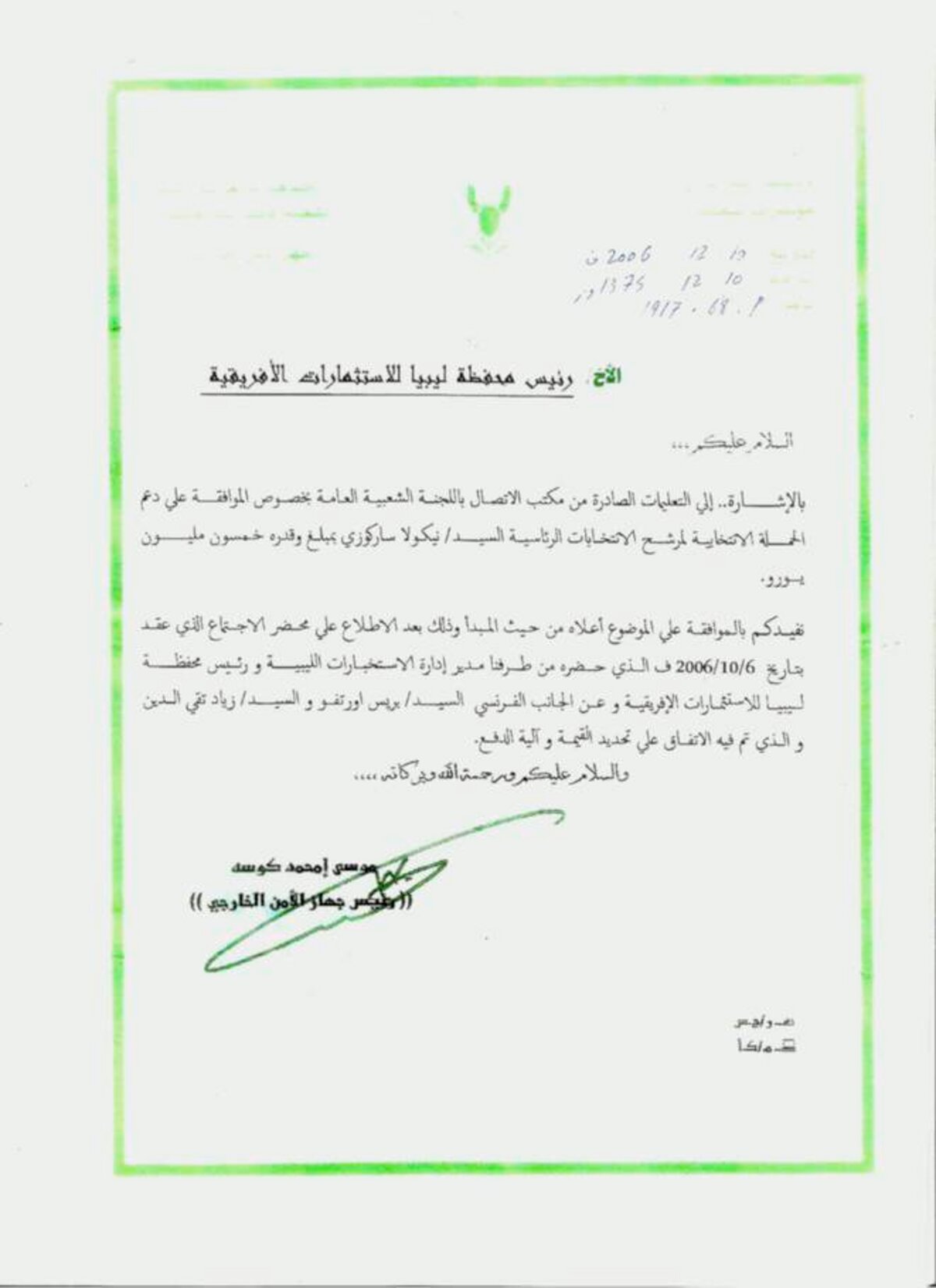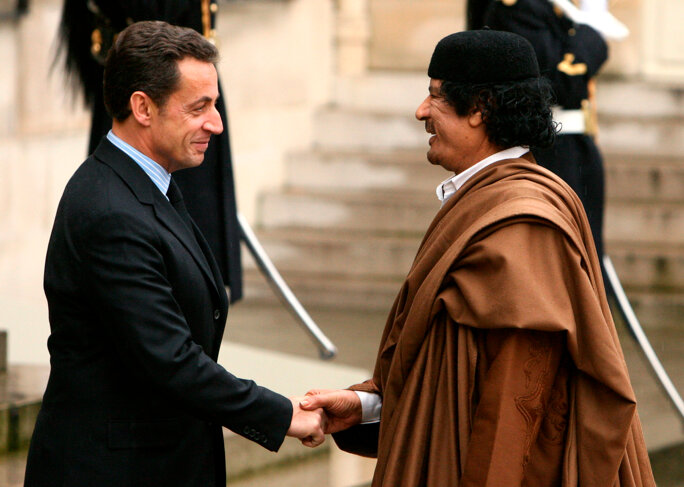Four years of investigations, beginning with a preliminary investigation by the Paris public prosecutor’s office, followed by a judicial investigation led by two magistrates, have now concluded that nothing calls into doubt the authenticity of a Libyan document revealed by Mediapart which details an agreement by the Gaddafi regime to fund Nicolas Sarkozy’s 2007 election campaign to the sum of 50 million euros.
The document was first published by Mediapart on April 28th 2012 in an article co-signed by Fabrice Arfi and Karl Laske (see here). Nicolas Sarkozy and his aide and friend Brice Hortefeux, who was cited in the document as being present at a meeting to discuss the amount and method of payment, subsequently launched a lawsuit against Mediapart for ‘forgery, handling forged documents, use of forgery and dissemination of false news’.
The thoroughness of the 46-page report, dated May 30th, explaining the reasons why investigating magistrates René Cros and Emmanuelle Legrand have found in favour of Mediapart, by dismissing the case, shows that every element that could possibly have placed Mediapart in difficulty was examined. But in vain.
“The totality of the investigations,” write the magistrates, “aimed at determining whether the document published by Mediapart was materially false, meaning that aside its contents [it was] an object created by assemblage or any other means, did not allow to determine this.”
The diversion that Nicolas Sarkozy attempted with this legal action, and which showed contempt for the press because he never attacked us for defamation, has finally fizzled out. The French justice system has clearly found that, after four years of all types of verifications, nothing throws into doubt the authenticity of this official document which was signed by the hand of Moussa Koussa, one of the late colonel Muammar Gaddafi’s closest aides, when Koussa was head of Libya’s foreign intelligence services.

Enlargement : Illustration 1

Now Sarkozy, who has ten days to appeal after receiving notification that the case is dismissed, must face up to the facts. The document published by Mediapart, dated December 10th 2006 and retrieved from the archives of the Libyan dictator after his fall in 2011, refers to “the approval of support for the electoral campaign of the candidate Monsieur Nicolas Sarkozy for the presidential elections, to the sum of fifty million euros”. This “agreement in principle”, the document states, was made in accordance with the notes of a meeting held on October 6th 2006 when two senior Libyan officials met with French emissaries Brice Hortefeux and Ziad Takieddine (a Paris-based arms broker and businessman who served as intermediary for Sarkozy’s entourage, as detailed here and here). The document makes clear that during the meeting with Hortefeux and Takieddine “an agreement was concluded to determine the amount and method of payment”.
Those events are the object of a separate judicial investigation, led by examining magistrate Serge Tournaire, and which was prompted by Mediapart’s revelations. Judge Tournaire’s ongoing investigation, into suspected ‘active and passive corruption, influence peddling, money laundering, misuse of assets, complicity in and handling of these’, has documented the close ties established as of 2005 between Nicolas Sarkozy and his entourage and the dictatorial regime of Muammar Gaddafi.
The revelation of the 2006 Libyan document detailing the agreement to fund Sarkozy came after several months of investigations by Mediapart into these secret relations with obvious financial stakes. Mediapart’s enquiries were prompted by the discovery of archives of documents belonging to the intermediary Ziad Takieddine. In face of the doubts expressed in certain media, which followed Sarkozy’s declarations that the Libyan document was a “vulgar forgery”, we have constantly stood firm in our insistence that it is authentic. Judges Cros and Legrand, dismissing the case against Mediapart, make clear in their conclusions that the note signed by Moussa Koussa has all the characteristics “of an official Libyan document”.
“Numerous witnesses have been interviewed,” the magistrates write, “who, by their functions, notably in Libya, were able to offer, beyond their personal opinions, an insightful appraisal of the presentation of the document [which is] argued as being false, with regard to documents of the Libyan administration, in a broad sense, with which they might have knowledge of.”
“From most of these interviews,” the magistrates continue, “it results that the document argued as being false presents the characteristic appearances of an official Libyan document, by the green colour of the header, the typical logo of the “Jamahirya”, its typography, the vocabulary used, the presence of specific Arabic turns of phrase, the form of address including the typically Libyan term “brother”. According to several witnesses among those who speak Arabic, with the exception of one, the text is written in good Arabic by an Arabophone in literal Arabic of an administrative nature.”
“According to one of the witnesses, the two dates that figure on the document argued to be false, one in accordance with the Gregorian calendar and the other with the calendar, imposed by colonel Gaddafi, unique to Libya, are concordant and coherent, whereas the calendar in use in Libya has changed four times under the regime of colonel Gaddafi, making it difficult for a non-Libyan to align the two dates a posteriori. Regarding such an account of a meeting, it is described by witnesses, without a judgment of its contents, as being typical of the bureaucratic habits of the Libyan administration”.
Beyond this testimony of experts who have perfect knowledge of Libya under the Gaddafi dictatorship, including diplomats, military officials and intelligence officers, the judges’ report confirms the authenticity of the signature of Moussa Koussa, who the magistrates questioned in Qatar, to where he fled after the fall of the Gaddafi regime. In passing, the magistrates underline that neither Nicolas Sarkozy nor Brice Hortefeux requested a second opinion after “the college of designated experts concluded, by comparing the signature that Mr Moussa Koussa left on each of the 13 pages of statements from his interview on August 5th 2014, in Qatar, with that which figures on the paper copy of the document argued to be false, that the signature which appears on the latter document is that of the hand of Mr Moussa Koussa”.

Enlargement : Illustration 2

The judges ridiculed Ziad Takieddine’s claim during their interview with him that his last name was misspelled in the Arabic text of the document. “An expert report and a counter-expertise report,” they wrote, “concluded that the spelling in Arabic of the family name Takieddine could not be written as indicated by Mr Takieddine, [and] that the correct spelling in Arabic was that which features in the text of the note argued to be false and that it was the one and only way in which to spell this name in Arabic.”
The judges had commissioned a very thorough technical expert’s appraisal of the computer file containing the document, with which it was published by Mediapart (see our previous report on this here). That expert appraisal “did not detect any trace of alteration or voluntary falsification,” underline the judges. “According to the expert, everything indicates that the digital image was initially the result of the digitisation of a physical document, most likely a paper one, which presented classic physical and symptomatic characteristics of such an object, being a certain degree of wear, even ageing.” As for the question of whether the document could have been a digital creation “the expert found that this is little likely given the technical means that would have to be employed to overcome the profound mathematical analysis that he used”.
Completing their demonstration that removes all doubt that the document could be a forgery, the judges considered the idea that it may have been an authentic Libyan document but created to give credence to a lie. This purely theoretical line of enquiry led from an uncertainty about the date of the meeting as cited in the document - October 6th 2006 - after Brice Hortefeux claimed that on that day he was in the town of Clermont-Ferrand in central France. The judges dismissed the idea, observing that “these uncertainties do not allow for a formal conclusion that such a meeting was impossible”.
Finally, the magistrates threw out the absurd suggestion that Mediapart was guilty of “handling” and “using” a forged document, which would imply that we had revealed the document in full knowledge that it was not authentic. To give credit to this suggestion, Nicolas Sarkozy and Brice Hortefeux relied on a false witness, a Libyan by the name of Djomode Elie Guetty, who pretended that he had alerted us, before the document was published, that it was not authentic. Fabrice Arfi and Karl Laske dismantled this false testimony, point by point, before the judges, and their demonstration was so implacable that Djomode Elie Guetty refused a confrontation with the two journalists to which the judges had invited him.
“There were insufficient [witness] charges to establish that [the journalists] knew that they had in their possession a forgery, or made use of a forgery, all the more so given that the counterfeit or falsified character of the document has not been established in a formal manner,” write the judges.
It took four years for the French justice system to acknowledge to the journalists the serious and thorough nature of their work, while also accepting, under the pressure brought by a political figure who had occupied the highest seat of government, to trample over the rights of the press. The judges’ order dismissing the case against Mediapart was preceded, two weeks earlier, by a case statement from Mediapart’s lawyers, Jean-Pierre Mignard and Emmanuel Tordjman, sent to the magistrates on May 17th. Before their demonstration that the document revealed by Mediapart was authentic, they began with the observation that for his defence, Nicolas Sarkozy had “recourse to procedures that are contrary to the regime that protects the freedom of information and the rights of the press, guaranteed by our constitutional principles and protected by the law of July 29th 1881”.
The conclusion of our lawyers’ statement read: “Four judicial experts’ reports whose conclusions match, numerous statements by indisputable specialists of the Gaddafi regime which underline the veracity of the text, colour and signs featured in the note, as also the absence of credibility and sincerity of just one witness statement [against Mediapart] confirm, beyond what is necessary, that the note published on April 28th 2012 by Mediapart presents every characteristic of being authentic.”
The conclusions of the judges in their order dismissing the case say nothing else.
It now remains for Nicolas Sarkozy, and beyond his person the French republic, to take on the heavy duty of facing up to the disturbing truth that our investigations revealed: the profiteering relations for financial gains knotted by the close circle of a future French president with a dictatorship, the downfall of which he would subsequently hasten.
We cannot imagine that the French justice system does not give itself the means of replying to the two questions this Libyan scandal raises: did the Libyan regime of Muammar Gaddafi finance the presidential election campaign of Nicolas Sarkozy in 2007? Did the French regime of Nicolas Sarkozy contribute to the fall of Gaddafi in order to destroy the traces of this?
-------------------------
- The French version of this article can be found here.


